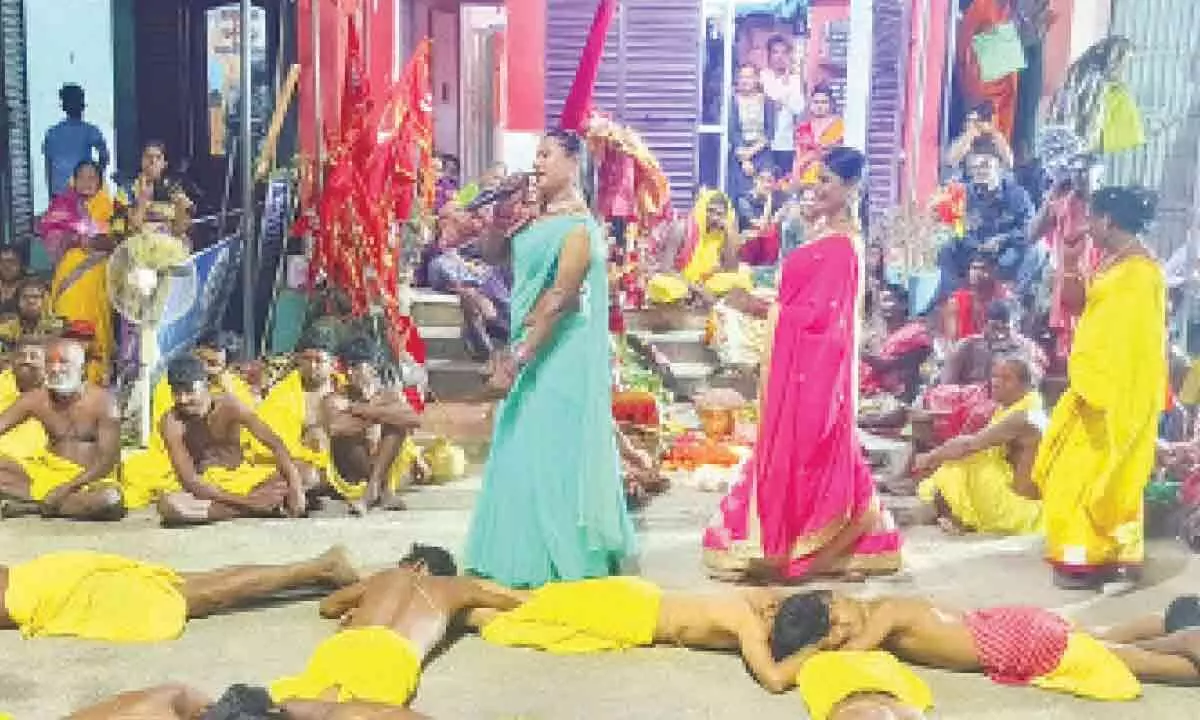Berhampur: Ganjam comes alive with ‘Danda Nacha’

The rhythm of drums, cymbals and conch shells is now reverberating in the air in Ganjam district as groups of ‘Danduas,’ clad in saffron ‘dhotis,’ are marching with flags under the scorching sun.
Berhampur : The rhythm of drums, cymbals and conch shells is now reverberating in the air in Ganjam district as groups of ‘Danduas,’ clad in saffron ‘dhotis,’ are marching with flags under the scorching sun. ‘Danda Nacha,’ the festival of hard penance, has started in Ganjam.
This year, Berhampur police made it mandatory for every household and the bazaar committees to take permission from the police prior to organising ‘Danda Nacha’ at their respective places. As it is poll time, police have made elaborate arrangements to avoid any untoward incident.
“Many organisers have already informed the police stations of their respective areas. We have told the organisers not to block traffic and play music after 10.30 pm. If anybody violates it, their properties would be seized and cases would be registered against the organisers”, said Berhampur SP Saravana Vivek M.
“Danda Nacha is considered to be the most ancient and traditional form of worship. We believe its origin was traced to 8th and 9th century AD (inception of Tantrism) after the decadence of Buddhism in Odisha. Abhinava Chandrika, a literary work of 1568, mentions the prevalence of Danda Nata or Yatra”, said Anantaram Kar, eminent researcher of Ganjam.
According to mythology, 13 sons of the great saint Tarani in ‘Tretaya Yug’ practised self-inflicted ‘punishment’ to appease Lord Brahma who cursed them for their misdeeds. Another legend says 13 sons of Indra and Kubera criticised the figure of the great saint ‘Astabakra’ who cursed them to be born in ‘Martya’ and suffer a lot.
The son of Indra, who took birth as a bird hunter, died after snakebite masterminded by Lord Shiva. He helped kill the bird hunter after the birds prayed to ‘Garuda’ who then prayed to Lord Shiva to find a way out. But the bird hunter regained his life after his two wives worshipped Maa Kali and the Goddess prayed to Lord Shiva to give life to the bird hunter. Maa Kali ordered the bird hunter to propagate her dignity, sources said.
‘Danda Nacha’ is performed during the month of ‘Chaitra’ and boasts of a pristine heritage. It begins 13, 18 or 21 days before ‘Bisuba Sankranti’.
While a group consists of 30 to 800 Danduas, each group is controlled by a person known as ‘Patta Dandua’ (Bhukta). Only males take part in this festival. ‘Patta Dandua’ confines himself to the temple of Kali and comes out on Bisuba Sankranti, the day after the last rituals is performed by his group. Danduas commit self-inflicted wounds to worship Lord Shiva because the philosophy of ancient Hindu says that for a person to be great, one has to have self-control over one’s body (Kaya), mind (Mana) and speech (Vakya). So, in order to achieve greatness, an individual has to undergo lot of punishments (Danda). So this event is known as Danda Nacha.
During this period, the Danduas stay away from near and dear ones and take food once a day. Though the penance has several restrictions and rituals, there is no bar on caste. The Dandua groups consist of persons from various sections of the society. They generally undertake the ordeal to get their wishes fulfilled. The Danduas perform various dances in three phases of Pani Danda, Dhuli Danda and Agni Danda. People worship them as they pass through the streets.
The dances are performed on the road in front of houses of those who invite them as per their religious vows. Other than the households, the bazaar committees also invite these Danda Nacha troupes to perform and worship goddess Kali.
While performing Dhulidanda, the Danduas start the performance in the morning. As per ritual, they endure the pain of sleeping on sand under the scorching sun and at sunset. They take a dip in ponds and remain there for more than an hour.














